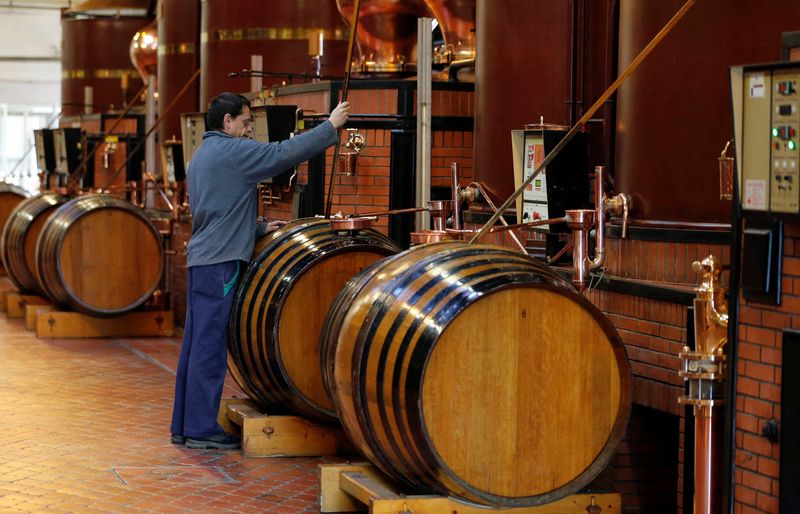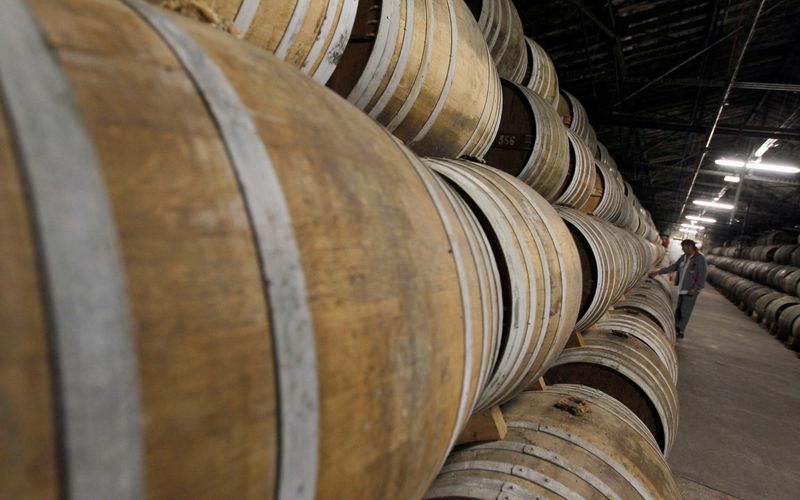By Emma Rumney
LONDON (Reuters) - High Chinese tariffs on EU brandy would leave French companies with vast amounts of cognac that could be hard to sell elsewhere, according to Reuters' calculations, analysts, and investors who fear firms could be forced to discount.
China opened an anti-dumping investigation into brandy imported from the European Union in January, sparking fears cognac could suffer a similar blow to that taken by Australian wine when China introduced tariffs of up to 218.4%.
Australian wine exports to China, worth $1.1 billion in 2019, were almost completely wiped out by high tariffs.
While a worst-case scenario, some analysts have been weighing what such an outcome would mean for the cognac industry and major French spirits makers such as Pernod Ricard (EPA:PERP) and Remy Cointreau.
Chinese President Xi Jinping was due to visit France on Monday. French authorities would raise the country's investigation into cognac during the visit, French officials said during a recent press briefing.
The cognac industry's "future depends" in part on tariffs being avoided through such talks, industry association the Bureau National Interprofessionnel du Cognac (BNIC) said in a statement on Thursday.
China accounted for 19.4% of exports in 2023, according to BNIC data. The Chinese market is also more profitable than others.
While low tariffs could be covered by price increases with relatively little disruption, higher tariffs could deal a substantial blow to that demand, Laurence Whyatt, analyst at Barclays said.
Remy and Pernod declined to comment. Their shares are down more than 16% and 5.7%, respectively, compared with before the probe was announced.
The BNIC said the bigger impact would be on 4,400 winegrowers and their families, as well as the entire cognac ecosystem and economy of the Cognac region, in southwest France.
WORST-CASE SCENARIO
There were 2 billion bottles worth of cognac ageing in barrels in France in 2023, 97% of which was destined for export markets, BNIC data showed.
If China's portion stayed at around 19%, that would mean at least 368.6 million bottles worth of ageing cognac was destined for China in the future, according to Reuters calculations based on that data. Some of that will be aged for a decade or more.
France shipped just over 35 million bottles worth of cognac to China last year, the BNIC says. If shipments continued at that rate, more than 175 million bottles would go to China over the next five years.
If high tariffs hit demand in a big way, dealing with all that stock would be a key challenge for producers, Whyatt and two investors said.
"They are left with all that cognac sitting in a warehouse just north of Bordeaux. It's very difficult to see how they solve that problem," Whyatt said.
Sales are declining sharply in cognac's other major market, the United States, and other markets are relatively small, meaning the cognac could not be easily sold elsewhere.
A key risk is that companies are forced to cut prices, damaging margins and brand value, Whyatt and two investors agreed.
However, companies would look to avoid this, said Chris Beckett, head of equity research at Quilter Cheviot, a Pernod investor.
One option would be to age the stock for longer, he added, though this would hit companies' working capital.

The worst-case scenario was unlikely, Oliver Adcock, fund manager at Remy and Pernod investor NS Partners said, adding he was hopeful Brussels could resolve the dispute quickly.
Australia's clash with China was more severe, agreed an industry source, who asked not to be named ahead of Xi's visit, adding there was no indication China's demand for cognac would significantly change.
